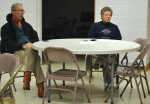Homelessness is real for some in USD 234 district

Those who attended Wednesday's Bourbon County Coalition meeting learned how real homeless is in the area.
One out of 30 children in the U.S. are homeless each year, according to HomelessChildrenAmerica.org.
In Fort Scott, USD 234 has 62 homeless students, according to Dave Elliott, homeless liaison for the district and Eugene Ware Elementary principal.
"Our best estimate is I'm probably identifying one-fourth of those (homeless students) that exist," Elliott said.
Sometimes providing the help needed is a challenge.
"There are those that refuse help," he said. "Some will not admit to being in that situation. It's my responsibility to identify those living in the condition of homelessness as identified by the McKinney-Ventro Act."
McKinney-Ventro Act
The McKinney-Vento Homeless Assistance Act defines homeless children and youth as individuals who lack a fixed, regular, and adequate nighttime residence, according the U.S. Dept. of Education.
The term includes children and youth who are: sharing the housing of other persons due to loss of housing through economic hardship. This is sometimes referred to as doubled-up, Elliott said.
"They go back into grandma's house or whatever, basically living in someone else's home," Elliott said. "The best way I've heard it defined is by a homeless high school student: 'We have an roof over our heads, but it ain't ours.'"
The definition also includes those that are living in a motel, hotel, trailer parks, or camping grounds due to lack of adequate accommodations.
"Not adequate usually means that the utilities are not working or the condition of the roof," Elliot said. "Almost all that I have are doubled up. I've got one family that's not adequately housed and one in a motel."
One help that he provides each student is immediate school enrollment.
"We can't delay them to wait on birth certificates or shot records," Elliott said. "Because if you are homeless and you are moving a lot, you can't find some of the stuff you need. They have trouble keeping track of those documents."
They are qualified immediately for the free school lunch program, he said and textbook rental fee is waived. Transportation to school is also provided.
"We have to provide them transportation to their school of origin," he said. "For example, if I have had a family at Eugene Ware (Elementary School) all along and Mom takes the children and moves into a crisis shelter in Pittsburg, they are automatically considered homeless. If they want to continue going to Eugene Ware, we have to provide that transportation to them when it is feasible to do so. The two school districts would share that expense."
He said he has access to federal funds to ensure students have what they need.
"Which means I buy school clothes, supplies, hygiene supplies, backpacks," he said. "If in dual credit classes, sometimes I pay the tuition for the class, all out of federal dollars."
All this is to provide education in the best interest of the student.
"We know that when they change schools frequently, holes are created in their learning. We also know that homeless students are way more likely to not graduate and what that does toward their future plans. So our goal is to keep them in a school environment, get them through graduation and set them up for future success.
"Additionally, we have students who are not only homeless, but unaccompanied, which means that they don't have a parental unit," he said. "I have five of those. They should all graduate this spring."
The homeless program is for students preschool through high school, he said.
"Interestingly, if I qualify a 4-year-old (as homeless) it jumps them up on the priority list for Head Start. So I work with the pre-school staff frequently."
Elliott said he has help with his responsibilities.
"Our school offices do the majority of the footwork for me," he said. "Our school secretaries know everything about everybody, everywhere. They do most of the contact for me. They do a good job."
Causes
According to The American Institutes for Research's National Center on Family Homelessness, the major causes of homelessness for children in the U.S. include: (1) the nation's high poverty rate; (2) lack of affordable housing across the nation; (3) continuing impacts of the Great Recession; (4) racial disparities; (5) the challenges of single parenting; and (6) the ways in which traumatic experiences, especially domestic violence, precede and prolong homelessness for families.
History of the Act
Elliott said the McKinney-Ventro Act was law for some time before it was utilized.
"Interestingly, it has been part of federal law for 20-some years. Nobody knew it for 10 of those 20 years. I came back from a meeting and let my superintendent know...that's been 10 years ago," he said.
"If you have someone living in that condition and live in our school district, have them give me a call, or visit with their school office," Elliot said.
Elliott can be reached at (620) 223-3380.
